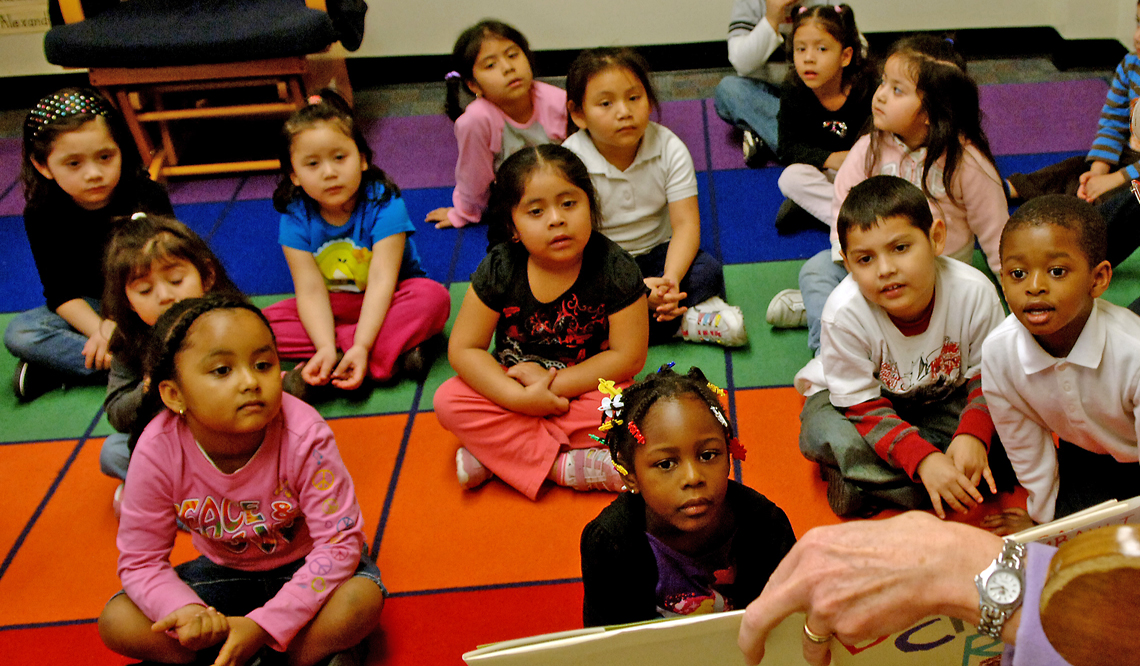Latino Families’ Use Of Early Education

Latino Families’ Use Of Early Education
There is widespread consensus that high quality pre-kindergarten programs can provide sizable benefits for young children and their families. For Hispanic[1] families the positive effects of pre-kindergarten on children’s school readiness outcomes appear to be even stronger. Despite these benefits, prior studies have found that Hispanic children consistently participate in early care and education (ECE) programs at substantially lower rates than their non-Hispanic peers. Some researchers have interpreted these patterns as reflecting either a limited supply of accessible and affordable care, and/or that Hispanic families have a cultural preference for either not placing their children in formalized care or they prefer to use relative care (e.g. grandmother care).
A new study released this week by the National Research Center on Hispanic Children and Families challenges these long-held assumptions about lower ECE participation of Latino families. The study found that approximately 83 percent of low-income Hispanic children in the Chicago Public Schools had participated in some form of publicly funded center-based or home-based ECE in the two years prior to kindergarten. The participation rate was higher than those found in prior studies, and was close to the 86 percent participation rate for low-income, non-Hispanic children. Furthermore, among Hispanics, neither language nor parents’ nativity appear to be obstacles to participating in publicly funded ECE.
Why do the findings from this study differ from prior research?
A few reasons may explain the divergence from prior research. First, this study draws upon an unprecedentedly rich set of integrated administrative data that provides a more complete picture of the available types of ECE programs. These data included records from the Chicago Public Schools, a range of ECE programs, as well as other public services such as income and nutrition support programs. This allowed researchers to focus the analyses on Illinois children who were born to low-income families, and follow them over time until they reached kindergarten. The data also permitted the researchers to account for numerous relevant factors—such as language and parents’ nativity—when examining whether participation in ECE programs differed between Hispanic and non-Hispanic families.
The second reason may be that ECE policies and practices in Chicago could be more effective at supporting Latino families. The high rates of ECE enrollment could be attributed to the responsiveness of program-level outreach, as well as recruitment and service delivery efforts to increasingly diverse families (including the cultural or linguistic match between staff and the population served).
There is also a wide range of publicly funded ECE programs in Chicago, including Head Start, Preschool for All (PFA), the Chicago Parent Child Centers, and other forms of center-based and family child care, including options supported by child care subsidies. Some of these programs, such as Chicago’s Preschool for All, prioritize enrollment for low-income families and those who speak a language other than English at home. Similarly, the Chicago Mayor’s “New Americans Plan” included recommendations for placing ECE sites in locations that are accessible and responsive to the needs of immigrant families.
ECE programs can attract Hispanic families
This study shows that publicly funded ECE programs can overcome some of the commonly encountered challenges and successfully recruit and serve Latino families. These latest findings add to a growing body of recent research on how the expansion of publicly funded programs and use of targeted outreach efforts may be reducing the disparities in ECE access, thus narrowing long-standing gaps in ECE participation. The study also highlights that programs have a responsibility to adapt their services to best meet the needs of a large and growing Hispanic population, such as by expanding the supply high-quality ECE options, hiring qualified bilingual/bicultural staff, proactively engaging in outreach to families in their home language, and ensuring that Hispanic families have equitable access to publicly funded programs.
About the Authors:
Renee Lamoreau, is a research assistant at Abt Associates with over 5 years of experience working in early childhood research and holds a degree in Community Health and Child Development.
Michael López, PhD, is a principal associate at Abt Associates and co-principal investigator for the National Research Center on Hispanic Children and Families, with over 25 years of experience conducting policy-relevant early childhood research at the state and national levels, with an emphasis on culturally and linguistically diverse populations.
Todd Grindal, Ed.D studies the impact of public policies on young children and children with disabilities and is a regular contributor to the Huffington Post.
Recent Articles
Things To Do
- Paulina Rubio en Phoenix Llega con Deseo
- MMA Fighter Jose “El Pochito” Alday Overcomes Challenges in Life; A Fighter with True Grit
- Fonseca’s “Simples Corazones Tour” June 5th in Phoenix is a Must
- Ramon Ayala and Bravos del Norte with Eliseo Robles June 15th Celebrity Theatre














